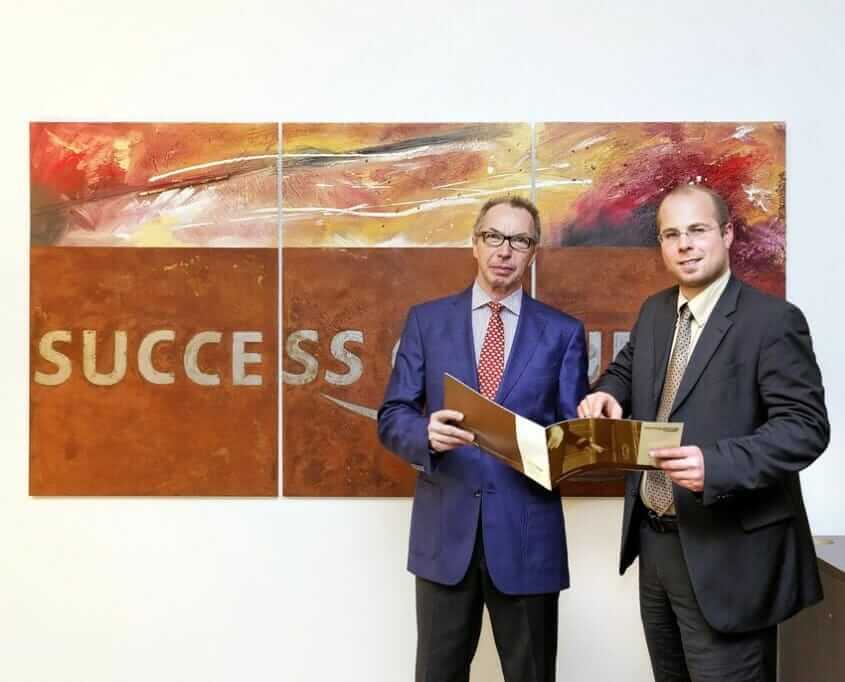Your shopping cart is currently empty!
For their successful, good life Information you really need: Government-funded publisher, awarded the Global Business Award as Publisher of the Year: Books, Magazine, eCourses, data-driven AI-Services. Print and online publications as well as the latest technology go hand in hand - with over 20 years of experience, partners like this Federal Ministry of Education, customers like Samsung, DELL, Telekom or universities. behind it Simone Janson, German Top 10 blogger, referenced in ARD, FAZ, ZEIT, WELT, Wikipedia.
Disclosure & Copyright: Image material via Ludwig-Ehrhard-Foundation & Rheinpfalz.
Studying in Europe: Red tape hurdles when studying abroad
By Simone Janson (More) • Last updated on October 21.09.2012, XNUMX • First published on 21.09.2012/XNUMX/XNUMX • So far 5182 readers, 1245 social media shares Likes & Reviews (5 / 5) • Read & write comments
According to the makers, studying in Europe is incredibly easy - and in reality incredibly complicated. What is important?

- Studying in Europe - the hurdles are there
- Is studying in the EU easier?
- Typical bureaucratic hurdles
- If you want to study, you have to take care of a lot yourself
- A lot is more difficult for applicants from non-EU countries
- The greatest difficulty is the financing of the studies
- Going abroad as an Erasmus student
- How does an ERASMUS degree work?
- ERASMUS is not a sure-fire success
- Conclusion: Studying in Europe is still difficult but not impossible
- Top books on the subject
- Read text as PDF
- Advice on success, goal achievement or marketing
- Book eCourse on Demand
- Skate eBook as desired
Studying in Europe - the hurdles are there
Europe is moving closer together. Many borders have already fallen in the EU. The universities also give special priority to international relations and, for example, on the homepage of the University of Bonn, warmly welcome foreign students.
However, there are still a number of bureaucratic hurdles that students from Europe have to overcome if they want to study in a neighboring country - especially if their home country is not part of the EU. Has studying really become easier in a united Europe?
Is studying in the EU easier?
The books on the subject (advertising)
"Not necessarily," says Marie-Amelie Lawn from France. When she started her studies in Germany, she had positive and negative Made experiences. Her French Baccalaureate was without Problems acknowledged: "I didn't even have to translate the sheet music," she says happily. The proof of financial means, with which all foreign students have to prove that they have at least 1300 marks a month at their disposal, was not a problem for the Frenchwoman either:
“A written confirmation from my parents was sufficient,” she says. Initially, however, it was different with the language, although she had learned German at school: “I had a lot of forms that I was supposed to fill out or the people in the offices just didn't understand,” she reports. In addition, the mathematics student had to pass the German language proficiency test (PND) in order to be able to study in Bonn at all.

Typical bureaucratic hurdles
However, she thought it was a pity that she had to take the oral exam on the first day of lectures. “It gives me important introductions to the University lost. That would be better to organize afterwards, she gets annoyed and adds: "Since I didn't know until the end of the language test whether I could really study in Bonn, I was able to look for a room very late and therefore only lived makeshift in the first semester. ”
Many foreign students, even if they come to Germany from an EU country, have similar or greater problems than Marie-Amelie when they start their studies. In order to keep the difficulties as low as possible, the German Academic Exchange Service (DAAD) advises foreign applicants to study in its brochure “Studies in Germany” one year before starting their studies with the Planning to start The brochure also explains the German higher education system and its admission requirements, lists the subjects that can be studied and gives the addresses of the German universities.
If you want to study, you have to take care of a lot yourself
Discounts for your success (advertising)!
They have to do a lot Candidate but then take care of it yourself from abroad, for example finding accommodation or any admission restrictions in your subject. However, it is positive that a certain percentage of subjects with restricted admission are reserved for foreign students. The DAAD also addresses the visa requirement:
Students from EU countries and some other countries such as Norway or Lichtenstein do not need a visa. All others must apply for a visa from the German consulate or message apply in their home country. However, this visa is only valid for the duration of your studies.

A lot is more difficult for applicants from non-EU countries
Anyone who does not come from an EU country must also have it checked whether his school leaving certificate qualifies him to study in Germany. Course achievements that have already been completed are not always recognized, as Luba Lobonosov reports. The Russian had already studied mathematics for four semesters in Moscow. In Bonn she had to start all over again with her studies. "In Russia we only go to school for ten years, the Russian school leaving certificate was credited to me here like a German secondary school leaving certificate," says Luba.
Therefore, in her case, the two years of study were counted as 12th and 13th grade. However, the Russian is right about that satisfied: “Many of my compatriots have to go to a preparatory college to prepare for the assessment test that gives them access to university. I was spared that." But Luba also had problems with the PND: "I took the exam again after a year of language course in Marburg and then in Bonn because the Bonn University has stricter regulations than other universities and does not recognize foreign PND exams," she recalls itself.
The greatest difficulty is the financing of the studies
Besides the language, one of the biggest difficulties for many foreigners without a scholarship is the language Financing their studies. "Don't plan to organize your study visit by working in Germany!" it says in “Studies in Germany”.
The DAAD does clear: Students who do not come from the European Union have significant disadvantages because they are only allowed to work for three months during the semester break. Anyone who breaks this rule can be expelled.

Going abroad as an Erasmus student
Christine Peters did not have any problems with financing during her ten-month stay in Italy. “My ERASMUS scholarship only covered the most necessary financial needs, but I also received an international grant”, says the student of history and Italian studies. However, before she had the scholarship in her pocket, she had to submit numerous applications: “The whole bureaucracy was quite cumbersome,” she still groans today. However, she was spared a language test, as is often the case: “My Professor said I went there to learn the language, ”she says.
ERASMUS (European Action Scheme for the Mobility of University Students) is an exchange program launched by the EU in 1987 to promote student mobility in Europe. ERASMUS has been part of the SOCRATES framework program since 1995, which promotes cross-border cooperation in the field of general Education to strengthen, continued. A similar program has existed since 1990 for some countries in Central and Eastern Europe as well as Mongolia: TEMPUS (Trans-European Mobility Program for University Studies) is intended to support the reform process towards a market economy and democratization of the universities through cooperation between the universities Society supported.
How does an ERASMUS degree work?
Students can take part in ERASMUS from the third semester at the earliest. You will then receive a partial scholarship for a minimum of three and a maximum of twelve months, which is intended to cover the additional costs that arise during a stay abroad. Tuition fees, which are the norm in many European countries, are not charged. The funds for these scholarships are passed on from Brussels to the universities via national ERASMUS agencies. How much a university receives depends on how many students and lecturers went abroad in the previous year as part of the ERASMUS program.
A university must also have a so-called university cooperation agreement with another European university, which regulates the exchange of students. These regulations should include, among other things, that the host university provides adequate support for the students and, for example, helps them find a room, and that study achievements made abroad must be credited to the agreed extent.
ERASMUS is not a sure-fire success
Christine didn't feel too much of either of these during her stay in Italy: “I had to look for a room or register with the Italian municipality all by myself”, she reports and adds: “Even the exams I took in Italy were only in Italian studies, not but recognized in history. " Nevertheless, the student does not want to miss the experience:
“Studying abroad broadens horizons An ERASMUS grant is the easiest way to go abroad because you get it relatively light and some hurdles fall away." Christine would also have liked to stay in Italy, but could not imagine completing her studies abroad. “I would simply take too much time with the language test or catching up on coursework verlieren”, she explains.

Conclusion: Studying in Europe is still difficult but not impossible
Studying in Europe has become much easier, not least thanks to the ERASMUS program. Nevertheless, as the three examples show, there is still a lot to be done at the universities themselves to make it easier for foreign students to study in Germany and for Germans to go to a foreign university - especially within, but also outside of the European Union.
Top books on the subject
Read text as PDF
Acquire this text as a PDF (only for own use without passing it on according to Terms and conditions): Please send us one after purchase eMail with the desired title supportberufebilder.de, we will then send the PDF to you immediately. You can also purchase text series.
4,99€Buy
Advice on success, goal achievement or marketing
You have Ask about career, Recruiting, personal development or increasing reach? Our AIAdviser helps you for 5 euros a month – free for book buyers. We offer special ones for other topics IT services
5,00€ / per month Book
Book eCourse on Demand
Up to 30 lessons with 4 learning tasks each + final lesson as a PDF download. Please send us one after purchase eMail with the desired title supportberufebilder.de. Alternatively, we would be happy to put your course together for you or offer you a personal, regular one eMail-Course - all further information!
29,99€Buy
Skate eBook as desired
If our store does not offer you your desired topic: We will be happy to put together a book according to your wishes and deliver it in a format of yours Choice. Please sign us after purchase supportberufebilder.de
79,99€Buy
Here writes for you
 Simone Janson is publisher, Consultant and one of the 10 most important German bloggers Blogger Relevance Index. She is also head of the Institute's job pictures Yourweb, with which she donates money for sustainable projects. According to ZEIT owns her trademarked blog Best of HR – Berufebilder.de® to the most important blogs for careers, professions and the world of work. More about her im Career. All texts by Simone Janson.
Simone Janson is publisher, Consultant and one of the 10 most important German bloggers Blogger Relevance Index. She is also head of the Institute's job pictures Yourweb, with which she donates money for sustainable projects. According to ZEIT owns her trademarked blog Best of HR – Berufebilder.de® to the most important blogs for careers, professions and the world of work. More about her im Career. All texts by Simone Janson.
2 Answers to "Study in Europe: bureaucratic hurdles when learning abroad"
-
Thanks for the numerous interesting hints, especially for studying abroad.
-
Thanks, I'm happy if older posts still find readers!
-


















Post a Comment